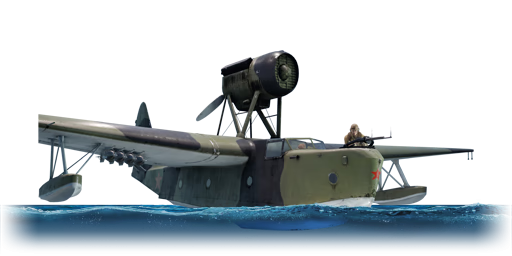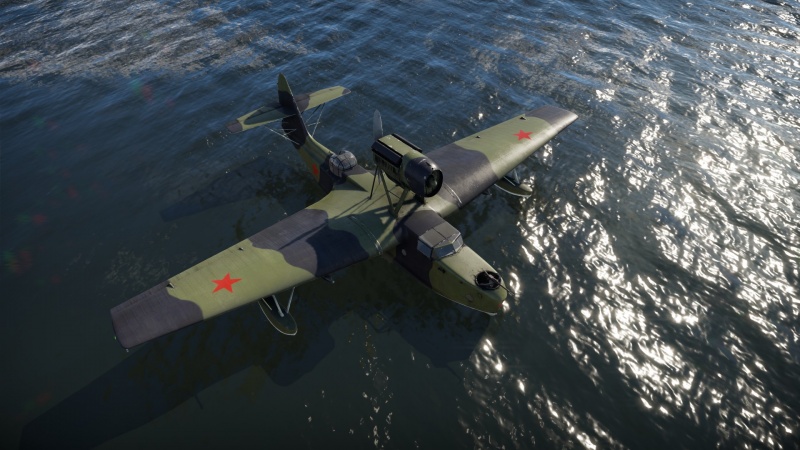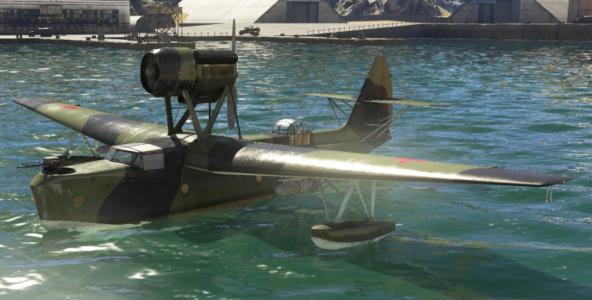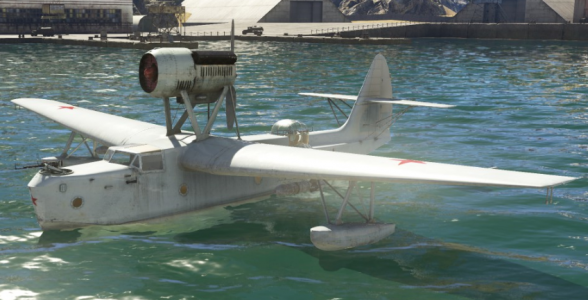Difference between revisions of "MBR-2-M-34"
(→Details) |
(→Description) |
||
| (2 intermediate revisions by one other user not shown) | |||
| Line 7: | Line 7: | ||
== Description == | == Description == | ||
<!-- ''In the description, the first part should be about the history of and the creation and combat usage of the aircraft, as well as its key features. In the second part, tell the reader about the aircraft in the game. Insert a screenshot of the vehicle, so that if the novice player does not remember the vehicle by name, he will immediately understand what kind of vehicle the article is talking about.'' --> | <!-- ''In the description, the first part should be about the history of and the creation and combat usage of the aircraft, as well as its key features. In the second part, tell the reader about the aircraft in the game. Insert a screenshot of the vehicle, so that if the novice player does not remember the vehicle by name, he will immediately understand what kind of vehicle the article is talking about.'' --> | ||
| − | The '''{{Specs|name}}''' | + | The '''{{Specs|name}}''' was a Soviet multi-purpose flying boat designed with the intent of carrying out maritime patrol missions for the Soviet Navy. It was developed in the 1930s by Beriev OKB, with Georgy Mikhailovich Beriev at the helm of the design, and was widely used during World War II. The {{Specs|name}} had a range of over 1,000 kilometres and was armed with various offensive weapons, such as machine guns and bombs. The name "MBR-2-'''M-34'''" stems from the aircraft's engine, the AM-34NB, which significantly enhanced its performance and reliability. Due to its versatility, the {{Specs|name}} was well-suited for not only maritime patrol but also for use as a light bomber and even a submarine hunter. Its sturdy construction allowed it to withstand harsh weather conditions, making it well suited for maritime operations. It most likely served with the Soviet Navy until the end of World War II, at which point it started to be gradually phased out. |
| + | |||
| + | The {{Specs|name}} was introduced during [[Update 1.57 "Battle March"]] as a reward vehicle for the [[wt:en/news/3681-special-event-series-chronicles-of-world-war-ii-day-28-faq-added-en|2016 "Chronicles of World War II"]]. It is best used in ground battles, where it can use one of its many loadout options for CAS. Its manoeuvrability is surprisingly good for a bomber of its size, allowing it to evade enemy fighters and deliver accurate strikes on ground targets. However, while its defensive armament is adequate, key components remain vulnerable to enemy fire due to a lack of armour protection. | ||
== General info == | == General info == | ||
Latest revision as of 21:04, 2 August 2023
Contents
Description
The MBR-2-M-34 was a Soviet multi-purpose flying boat designed with the intent of carrying out maritime patrol missions for the Soviet Navy. It was developed in the 1930s by Beriev OKB, with Georgy Mikhailovich Beriev at the helm of the design, and was widely used during World War II. The MBR-2-M-34 had a range of over 1,000 kilometres and was armed with various offensive weapons, such as machine guns and bombs. The name "MBR-2-M-34" stems from the aircraft's engine, the AM-34NB, which significantly enhanced its performance and reliability. Due to its versatility, the MBR-2-M-34 was well-suited for not only maritime patrol but also for use as a light bomber and even a submarine hunter. Its sturdy construction allowed it to withstand harsh weather conditions, making it well suited for maritime operations. It most likely served with the Soviet Navy until the end of World War II, at which point it started to be gradually phased out.
The MBR-2-M-34 was introduced during Update 1.57 "Battle March" as a reward vehicle for the 2016 "Chronicles of World War II". It is best used in ground battles, where it can use one of its many loadout options for CAS. Its manoeuvrability is surprisingly good for a bomber of its size, allowing it to evade enemy fighters and deliver accurate strikes on ground targets. However, while its defensive armament is adequate, key components remain vulnerable to enemy fire due to a lack of armour protection.
General info
Flight performance
| Characteristics | Max Speed (km/h at 5,000 m) |
Max altitude (metres) |
Turn time (seconds) |
Rate of climb (metres/second) |
Take-off run (metres) | |||
|---|---|---|---|---|---|---|---|---|
| AB | RB | AB | RB | AB | RB | |||
| Stock | 270 | 265 | 5000 | 18.5 | 19.1 | 3.0 | 3.0 | 450 |
| Upgraded | 280 | 275 | 17.5 | 18.0 | 4.5 | 3.8 | ||
Details
| Features | ||||
|---|---|---|---|---|
| Combat flaps | Take-off flaps | Landing flaps | Air brakes | Arrestor gear |
| ✓ | ✓ | ✓ | X | X |
| Limits | ||||||
|---|---|---|---|---|---|---|
| Wings (km/h) | Gear (km/h) | Flaps (km/h) | Max Static G | |||
| Combat | Take-off | Landing | + | - | ||
| 405 | 450 | 405 | 405 | 320 | ~7 | ~3 |
| Optimal velocities (km/h) | |||
|---|---|---|---|
| Ailerons | Rudder | Elevators | Radiator |
| < 220 | < 220 | < 230 | > 322 |
Survivability and armour
The MBR-2 has surprisingly good survivability taking into account that it has no armour protection. Its main weak point is the engine, it is very exposed and prone to taking hits - something to be expected for a top-mounted engine. But if you don't sustain critical damage to the engine or catch fire, the sturdy fuselage and wings often tank out most light machine gun fire which it faces.
Landings are also of course a risk for the MBR. For landings on solid ground it is recommended to lower your speed to under 200 km/h, that way you don't damage the fuselage and have less of a risk of ripping your wing or wing pontoons. Same applies for water landings which are substantially better for the plane since it's what it's designed for.
In short your engine is vulnerable, fires usually burn through your wooden fuselage and landings should be done at slow speeds.
Modifications and economy
Armaments
Suspended armament
The MBR-2-M-34 can be outfitted with the following ordnance:
- 8 x 50 kg FAB-50 bombs (400 kg total)
- 2 x 100 kg FAB-100 bombs + 6 x 50 kg FAB-50 bombs (500 kg total)
- 4 x 100 kg FAB-100 bombs (400 kg total)
- 2 x 250 kg FAB-250M43 bombs (500 kg total)
Defensive armament
The MBR-2-M-34 is defended by:
- 1 x 7.62 mm ShKAS machine gun, nose turret (1,000 rpg)
- 1 x 7.62 mm ShKAS machine gun, dorsal turret (1,500 rpg)
Usage in battles
Describe the tactics of playing in the aircraft, the features of using aircraft in a team and advice on tactics. Refrain from creating a "guide" - do not impose a single point of view, but instead, give the reader food for thought. Examine the most dangerous enemies and give recommendations on fighting them. If necessary, note the specifics of the game in different modes (AB, RB, SB).
Manual Engine Control
| MEC elements | ||||||
|---|---|---|---|---|---|---|
| Mixer | Pitch | Radiator | Supercharger | Turbocharger | ||
| Oil | Water | Type | ||||
| Not controllable | Not controllable Not auto controlled |
Not controllable Not auto controlled |
Controllable Not auto controlled |
Combined | Not controllable 1 gear |
Not controllable |
Pros and cons
Pros:
- Surprisingly manoeuvrable, especially with its combat flaps
- Ability to land on water (Rivers, lakes, oceans and so on.)
- Purchasable winter camo helps to hide in snowy maps
- Decent amount of ammunition for gunners
- Thanks to sturdy construction the plane is quite forgiving when landing
Cons:
- No armour protection for crew or critical components
- Large unprotected non-self sealing fuel tanks
- Large exposed top mounted engine
- Engine limits the targeting angles of the gunners
- Very vulnerable from attacks coming from below
History
The MBR-2 was a Soviet multi-purpose (including reconnaissance) flying boat. It entered service in the Soviet Navy in 1935 and 1,365 were built, in 6 versions. Some were used by foreign countries, including Finland and North Korea. In the Soviet Union, it sometimes carried the nickname of "Kорова" (cow) and "Амбар" (barn). After the Second World war, the plane was used to watch over fishing areas.
It saw extensive service during the Soviet-Finnish winter war between 1939 and 1940, and against Germany from June 1941. It demonstrated reliability and robustness throughout these conflicts. Several MBR-2s returned safely to missions after receiving enemy fire. The MBR-2 was able to be equipped with wheels or skis, thus adapting to many areas of operation. Faced with the shortage of aircraft in flight, its armament was adopted in June 1941 by the Soviet authorities to carry out night bombardments, then diurnal. It's very slow speed made it very useful for submarine hunting.
The in-game MBR-2 is the MBR-2bis (also known as MBR-2AM-34). It was developed in 1935 as an improved version, powered by the Mikulin AM-34N engine, and fitted with an enclosed cockpit, a dorsal gun-turret and enlarged vertical tail. The machine remained in production until 1941 with this configuration.
Media
- Skins
- Images
- Videos
See also
Links to the articles on the War Thunder Wiki that you think will be useful for the reader, for example:
- reference to the series of the aircraft;
- links to approximate analogues of other nations and research trees.
External links
- Official data sheet - more details about the performance
- Biplans, triplans et hydravions 1914/1939, Elcy, 2013, ISBN 2753205337 (French)
| Beriev Design Bureau (Бериева Опытное конструкторское бюро) | |
|---|---|
| Bombers | MBR-2-M-34 · Be-6 |
| Recon | KOR-1 |
| USSR bombers | |
|---|---|
| SB and Ar | SB 2M-100 · SB 2M-103 · SB 2M-103 MV-3 · SB 2M-103U · SB 2M-103U MV-3 · SB 2M-105 · Ar-2 |
| Yer-2 (petrol) | Yer-2 (M-105) · Yer-2 (M-105) TAT · Yer-2 (M-105R) TAT · Yer-2 (M-105R) LU |
| Yer-2 (diesel) | Yer-2 (ACh-30B) (e) · Yer-2 (ACh-30B) (l) |
| Tu | Tu-2 · Tu-2S · Tu-2S-44 · Tu-2S-59 · Tu-4 |
| Pe | Pe-2-1 · Pe-2-31 · Pe-2-83 · Pe-2-110 · Pe-2-205 · Pe-2-359 · Pe-8 |
| IL | DB-3B · IL-4 |
| Po | Po-2 · Po-2M |
| Other | MBR-2-M-34 · TB-3M-17-32 · Yak-4 · Be-6 |
| Lend-Lease | ▂PBY-5A Catalina · ▂Hampden TB Mk I · ▂A-20G-30 · ▂B-25J-30 |
| USSR premium aircraft | |
|---|---|
| Fighters | Krasnolutsky's I-15bis · I-16 type 28 · Zhukovsky's I-153-M62 · I-153P · I-180S · I-301 · ITP (M-1) |
| LaGG-3-4 · LaGG-3-23 · LaGG-3-34 · Dolgushin's La-7 · La-11 | |
| Eremin's Yak-3(e) · Yak-3 (VK-107) · Yak-3T · Golovachev's Yak-9M | |
| ▂P-39K-1 · ▂Pokryshkin's P-39N-0 · ▂P-39Q-15 · ▂P-40E-1 · ▂P-47D-27 · ▂P-63A-5 · ▂P-63A-10 · ▂P-63C-5 | |
| ▂Hurricane Mk IIB · ▂Spitfire Mk IXc · ▂Fw 190 D-9 | |
| Twin-engine fighters | I-29 |
| Jet fighters | Su-11 · MiG-15bis ISh · MiG-17AS · MiG-21S (R-13-300) · MiG-23ML |
| Strike aircraft | IL-2M "Avenger" · IL-2 M-82 · IL-8 (1944) · Su-6 · Tandem MAI · TIS MA · Su-8 · Tu-1 |
| Yak-38 · Su-7BMK · Su-25K · Su-39 | |
| Bombers | Po-2M · Be-6 · MBR-2-M-34 · Pe-2-205 · TB-3M-17-32 |
| ▂PBY-5A Catalina · ▂Hampden TB Mk I · ▂A-20G-30 · ▂B-25J-30 | |







